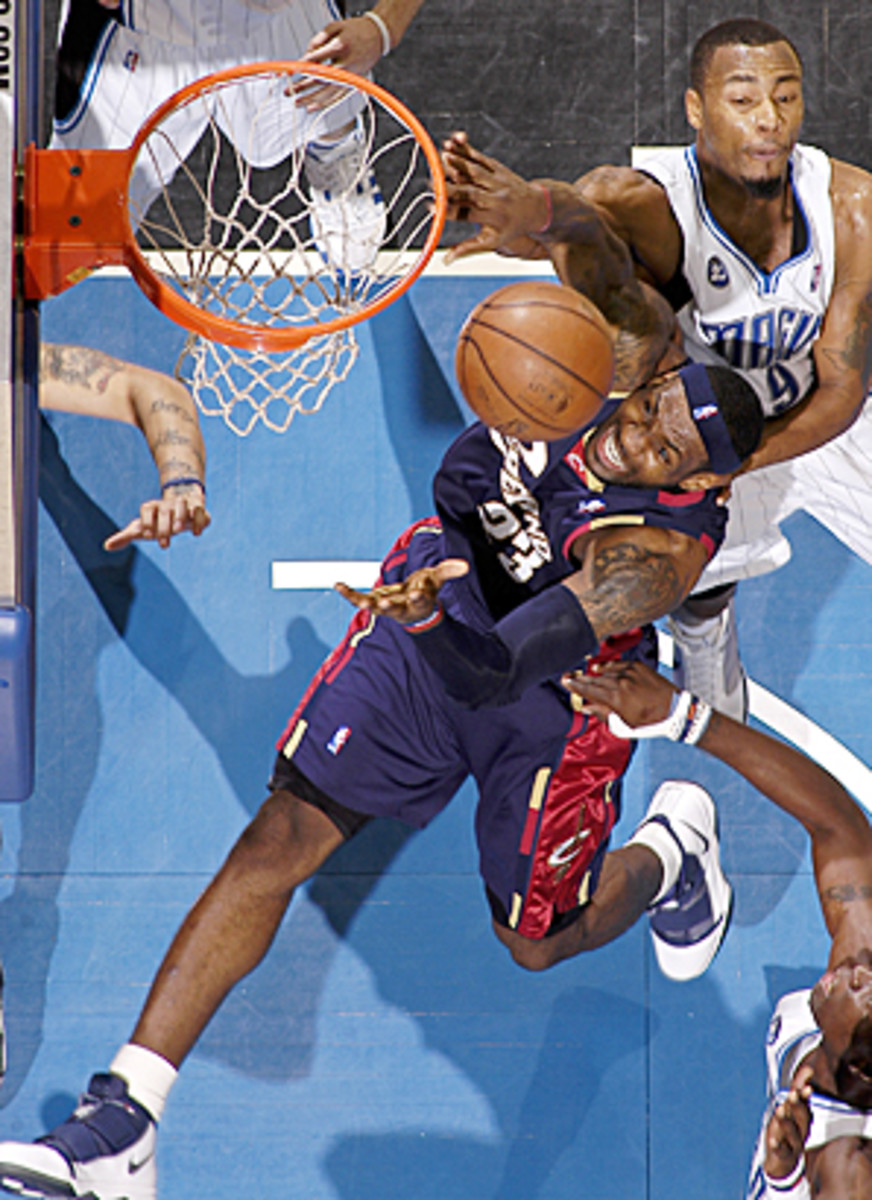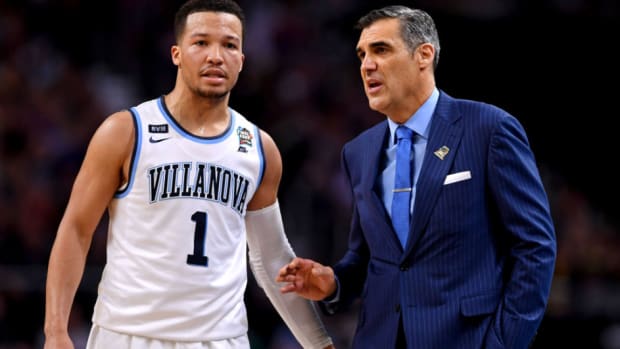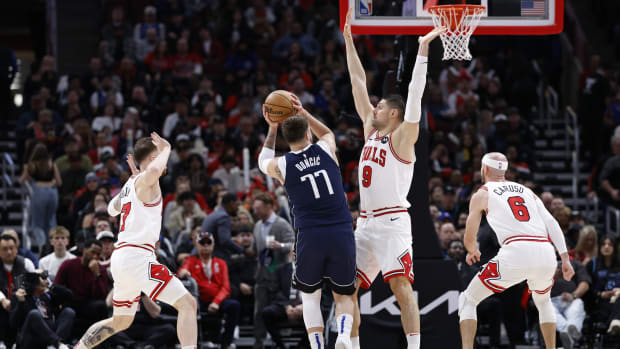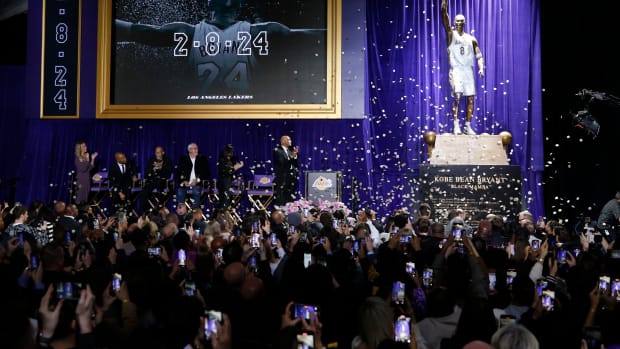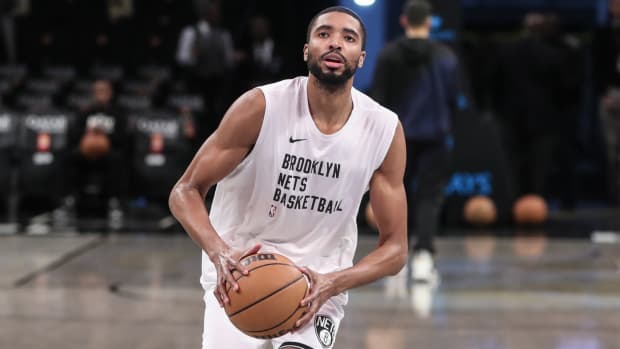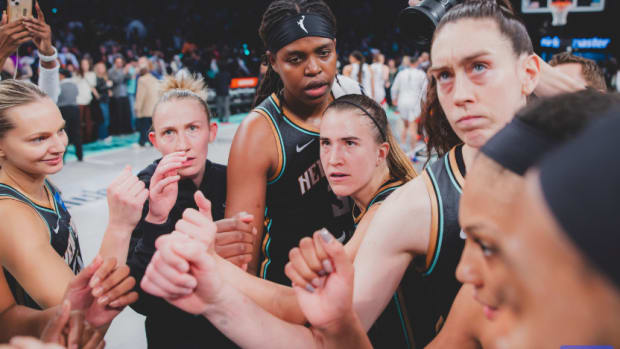Roundtable: LeBron's future
In the wake of Cleveland's loss in the Eastern Conference finals, SI.com's NBA experts assess LeBron James' future with the team -- or elsewhere.
1. How will the Cavs' loss affect LeBron's future with the team?
Ian Thomsen: Is he going to leave Cleveland? I still think it's a longshot, to which he'll commit only if he views a better chance to win with another franchise. Will the Knicks be able to provide such an opportunity? That's an even bigger longshot.
It's important that James maintain the leverage -- the implied threat -- of leaving Cleveland in order to maintain pressure on the Cavaliers to improve the team around him. Right now, it is in his best interests to not create the impression that he will re-sign with the Cavaliers no matter what. He will want them to do anything possible to improve the team around him, and from his point of view the only leverage he'll have will be to threaten to leave if they fail to make the necessary improvement.
Jack McCallum: I've looked stupid over the years trying to predict what athletes are going to do (that's not the only time), but my guess is that the loss will have a profound effect. Young superstars are notoriously impatient, and my best guess is that it will be a major factor in his leaving Cleveland in the summer of 2010, believing, as he might, that he has done everything humanly possible to bring the city a championship and it didn't happen. What we have to remember, of course, is that the Cavs could win the title next year and all bets are off.
Chris Mannix: The ability to provide LeBron with a potential dynasty was one of Cleveland's strongest selling points and perhaps the only advantage they have over the Knicks, who will strip their roster after next season in anticipation of signing James and a quality sidekick. So this loss hurts. That said, I think next season is more important. If the Cavaliers win the championship in 2010, it is going to be difficult for James to participate in a parade in Cleveland in late June and walk away from them in early July.
Steve Aschburner: I'd like to think that this will bond James to the Cavaliers more than ever, this sense of a job unfinished. Together, he, his teammates, the staff and the fans got another taste and a glimpse of what was possible, with some real clarity for things they can do to go another step or two -- six victories, really -- beyond. I long have thought that winning a title in Cleveland would free James to go on to bigger and better places, more than failing to win would frustrate him into leaving.
Scott Howard-Cooper: How can it not weigh heavily in his decision? July 2010 is forever away and the Cavaliers should be contenders again next season, creating the opportunity to replace this memory with a more favorable outcome, but this may have been their best shot. Very good defense, home court advantage through the playoffs after being nearly unbeatable in Cleveland, rested, the Celtics down Kevin Garnett, the Magic down Jameer Nelson ... and the Cavs don't even get to the Finals. They don't even get close. One of the greatest individual runs in playoff history led to nothing. Good luck ignoring that as he contemplates whether the Cavaliers provide the best chance at a title.
2. What does Cleveland need to do to improve LeBron's supporting cast?
Ian Thomsen: It's simple: He needs more guys to make plays. The Cavaliers have steadily raised the level of talent around James, but there are more upgrades to make. The issue for Cleveland is whether to make a big move now or to wait until 2010, when they would have cap space to add a major free agent around LeBron. But they aren't likely to wait that long. Look for a major trade this summer.
Jack McCallum: It's not like the supporting cast was suddenly switched with, say, the Sacramento Kings' supporting cast. This is the same supporting group that helped the Cavs win a league-best 66 games. But their overall performance in this series ranged from mediocre to miserable. Mo Williams looks to be a reliable Sundance to LeBron's Butch Cassidy, but he wilted in this pressure. Perhaps it won't happen next year. Having said that, they need a drop-dead three-point shooter, like a Jason Kapono, and a big man with a reliable back-to-the-basket offensive game, so James does not have to fulfill both of those roles.
Chris Mannix: They need another big-time scorer and for that to happen they need to forget about stock piling cap space for 2010 and make a major deal this offseason. In hindsight, it was a collossal mistake to hold onto Wally Szczerbiak (1.8 points per game in the conference finals) at the trade deadline when they could have flipped him for a better player with a bigger salary. The Cavs will once again have a major chip to deal this summer in the expiring contract of Ben Wallace ($14 million), two if you include Sasha Pavlovic ($4.95 million). Big names (Amare Stoudemire, for one) will be available. The worst thing Cavs GM Danny Ferry is stand pat and hope LeBron can carry them again. That's a bad idea in the short and long term.
Steve Aschburner: I saw the same things everyone else saw -- a backcourt that needs more size and a frontcourt that needs more youth. The Cavs aren't going to have to cope with a ball-handling Hedo Turkoglu on a nightly basis, but they could stand to mix in one or two slashers or wing players in the 6-5, 6-6 range for more and better defensive options. Williams, Delonte West, Daniel Gibson -- they're all pocket-sized by NBA standards. Up front, Zydrunas Ilgauskas, Ben Wallace and Joe Smith are on their last legs, not offering enough at either end beyond their six fouls each.
Scott Howard-Cooper: A lot of what went wrong against Orlando was because of the matchup. Anderson Varejao couldn't chase Rashard Lewis and muscle around with Dwight Howard. Welcome to the problem the rest of the league faced. Howard tore through the Cavaliers inside, and ditto. Because of the way Cleveland rolled through the first two rounds, no one could have imagined it was this vulnerable in the right circumstances. Except this was not just about the East finals. The Cavs need to get better inside, whether through offseason move or developing rookie J.J. Hickson at power forward, quickly. They are good on the boards, but that's misleading because an unusually large contribution comes from the small forward, one LeBron James.
3. Does Cleveland's on-court strategy best utilize LeBron's skills? If not, how should they change their approach?
Ian Thomsen: The unfortunate truth for Cleveland is that Orlando is the only team capable of embarrassing them, because of the various matchup problems at the three-point line and the space they created for Dwight Howard to dominate down low. It's no exaggeration to say the Cavaliers would have had a better chance against the Celtics with a healthy Kevin Garnett than they had against this Magic team.
There is nothing wrong with the way they use LeBron. He's become an All-NBA defender, and his MVP award as well as his across-the-board stats are proof that they're maxing him out by putting the ball in his hands to let him make plays. Now they need to continue providing him with better targets for his passing.
Jack McCallum: Just to get defense out of the way, it looked like LeBron was misused in this series. Why he didn't guard Turkoglu or Lewis is beyond me. Great players can play major roles at both ends of the court. That's what they want to do. That's why they're great players.
As for offense, the word I would use to describe Cleveland's is "formless." When the Chicago Bulls finally broke through with Michael Jordan and his supporting cast -- which was not until his seventh year in the league, I might add, which is what LeBron will enter in the '09-10 season -- it was largely because they finally found the proper balance between Jordan's dominating the ball one-on-one and Jordan's being part of a set offense. In the Bulls' case, that was the triangle, and I still see that as a major reason that Phil Jackson's teams were, and are, successful. Sure, there are times when LeBron has to come out and dominate the ball, but he would be better served if his one-on-one play could be integrated into an offense that keeps the floor balanced and others involved.
Chris Mannix: I didn't have a problem with Cleveland's offensive approach. Cavs assistant coach John Kuester is a terrific offensive coordinator in the Cleveland huddle and while at times the offense looked too LeBron-centric the ball movement was generally there; the Cavs just weren't making open shots. Mo Williams (37.1 percent from the floor) and Szczerbiak (21.4 percent) were the primary culprits in the conference finals, but as a team Cleveland wasn't making the shots that they were knocking down with regularity in the regular season. As a result, the games were closer, LeBron had to play more minutes (44.3 this round) and it took its toll at the end.
Steve Aschburner: It's not much fun watching James go 1-on-5, but until the NBA deploys that in-development crew of robot referees who will call all fouls the same -- whether applied to journeyman or superstar -- there will always be value in having that guy who can draw whistles seemingly every time he gets into the lane. Part of the beauty of having LeBron James is that it means 29 other teams do not have him, so Cleveland always needs to flex that advantage. It just needs more reliable shooters and more versatile defenders around him.
Scott Howard-Cooper: Yes. There is no answer with flowing analysis. Yes. James is a great offensive player who had the ball in any situation. He has become a star on defense and has been rewarded with praise there as well. The Cleveland problem is not whether James is properly utilized.
4. The Cavaliers recently agreed to sell a stake in the team to investors from China, which some feel will allow LeBron to expand his reach into the country. What do you feel will guide James' decision as to where he plays after 2010: financial potential or on-court success?
Ian Thomsen: His financial potential is based in his success on the court. There will be no global empire if he doesn't follow \Jordan's examples and establish himself as a champion who wins multiple titles. Winning will trump everything, which is why the allure of New York shouldn't be enough: Why would he go there unless he was convinced the Knicks will win big?
Jack McCallum: Obviously, the man knows how to maximize his commercial impact, and he and his people have made shrewd offcourt decisions that have put him in the Jordan-Tiger Woods class as a pitchman. But from what I see of LeBron on the court, I think he's about winning a championship, winning a bunch of championships, in fact. That will drive his decision more than anything.
Chris Mannix: James has made it clear in numerous interviews his desire to be the richest man on the planet. He dines with billionaire Warren Buffet and has a whole team thinking up ways to maximize his value. So money will play an enormous role. I'm one of those people that believe that where James lives or who owns the team won't significantly impact the amount of money he makes. He's one of those rare transcedent stars that doesn't need a Manhattan or Los Angeles address for that.
But this might come down to a personal choice. James is a fashion plate; he tries to wear the 'it' designer before anyone else. He has that very New York state of mind. So the question could come down to this: does he want to become basketball's Derek Jeter, a 20-something mega star living in the city nine months out of the year? There is a certain appeal to that. Jeter is a beloved figure and has made a fortune (as well as won four World Series) in New York. James might want that. But he has to be cognizant of the potential downside: he could wind up more like A-Rod. Jeter was a home grown talent who came up through the Yankees farm system. A-Rod, like James would be, is a well-paid mercenary who despite being the best player in baseball has never quite achieved the popularity of Jeter and took the brunt of the abuse (pre-steroids admission) when the Yankees didn't win the title.
There is a lot of money and fame in New York but there is a lot of pressure that comes with it. James has done a remarkable job of keeping his name out of the gossip rags and hasn't made any Wikipedia-worthy mistakes. But that could change if he chooses to play in the New York fishbowl and if it does, I wonder how he would handle it and if he would ever regret leaving behind a city or an organization that is willing to bend over backwards to satisfy him.
Steve Aschburner: I'm aware of James' ambitions on both fronts. He wants to win an NBA championship (no doubt more than one) and he wants to be a billionaire. He can do the former without achieving the latter, but I'm not sure it would work the other way around. To grab his rung on the Forbes 400 -- that's it, he wants a ring and a rung! -- and to hang with Warren Buffet without wondering if Buffet is slumming, James needs to maximize his opportunities and his profile. He, New York and the NBA need each other, however bogus a Knicks/Nets myopia might seem to mere sports fans. James is thinking way beyond sports, which invariably will mean way beyond Cleveland. Just as Kobe Bryant swapped out Charlotte for L.A. before he ever played an NBA game, just as Garnett needed Boston's tradition and basketball passions to make his career complete, James needs the platform that only New York can provide.
Scott Howard-Cooper: It's about the ring. It has to be about the ring because James can't truly stake a claim as the greatest player ever without a championship. The title has to be part of the blueprint for world domination. The financial potential will be there no matter what. Stay in Cleveland for a bigger basketball contract, go to New York for greater marketing opportunities that will offset the salary-cap rules -- whatever. He's getting bazillions of dollars anywhere. But James is not getting his spot on Mt. Olympus without standing atop the NBA.






























